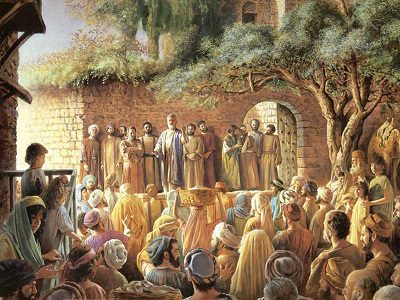
Peter’s Speech
In the Sermon on the Mount, Jesus taught His disciples that it is not enough not to kill, but that they must not have anger in their hearts and be reconciled with their brothers. Jesus taught them that it is not enough not to commit adultery, but that one must not look lustfully at others, and that there can be no divorce in lawful marriages. Jesus taught them that it is not enough not to take a false oath, but that they should not swear at all; i.e., they must be truthful to the extent that taking oaths would become unnecessary. (see Matthew 5:21-37)
With these and other teachings at the Sermon on the Mount, Jesus points out that the observance of God’s commandments is more than just carrying out the letter of the law, but that it involves a change in one’s mind and heart that totally changes one’s way of life. And that is the point of the Beatitudes as well – it is not a list of what to do and what not to do, but it is about taking on a new kind of attitude and behavior in life that centers on Jesus Christ.
Many bible-reading Christians are familiar with the phrase “call on the Name of the Lord.” It appears at least 3 times in the bible: Joel 3:5, Acts 2:21 and Romans 10:13. Unfortunately, many had been led to believe only its literal sense; i.e., that one is saved simply because they once called on Jesus to save them.
The Book of Joel spoke about the Day of the Lord: It shall come to pass, I will pour out my spirit upon all flesh. Your sons and daughters will prophesy, your old men will dream dreams, your young men will see visions… the sun will darken, the moon turn blood-red, before the day of the LORD arrives, that great and terrible day. Then everyone who calls upon the name of the LORD will escape harm. (Joel 3:1, 4-5)
Peter’s speech at Pentecost, which was directed towards Jews who had come from every nation, pointed out that the Day of the Lord has been fulfilled with the coming of the Holy Spirit, such that everyone who calls on the name of the Lord shall be saved (cf. Acts 2:21).
What does it mean to call on the Name of the Lord?
In Acts, it means: (1) To believe that Jesus of Nazareth is the Christ (cf. Acts 2:36), (2) To repent and be baptized (cf. Acts 2:38), (3) To devote oneself to apostolic teaching, to community life, to the breaking of the bread and to prayer (cf. Acts 2:42), and attending to the poor within the community (Acts 2:45). Repentance is a change of mind and heart toward God which is reflected in the actual goodness of one’s life. Repentance is not something done once or twice, or a few times in the past; it is an ongoing process which lasts a lifetime.
The message of Romans 10 is that having a valid relationship with God depends on having faith in God’s saving action in Jesus Christ, rather than the literal adherence to the Mosaic law. After all, the true meaning of the Mosaic law cannot be understood apart from Christ. Jesus said, “I have come not to abolish the law but to fulfill. (Matthew 5:17)” In the Sermon on the Mount, Jesus fulfilled the law; in this context, to fulfill means to make perfect. Jesus perfected the law by teaching that the spirit of the law must be kept in the hearts of believers.